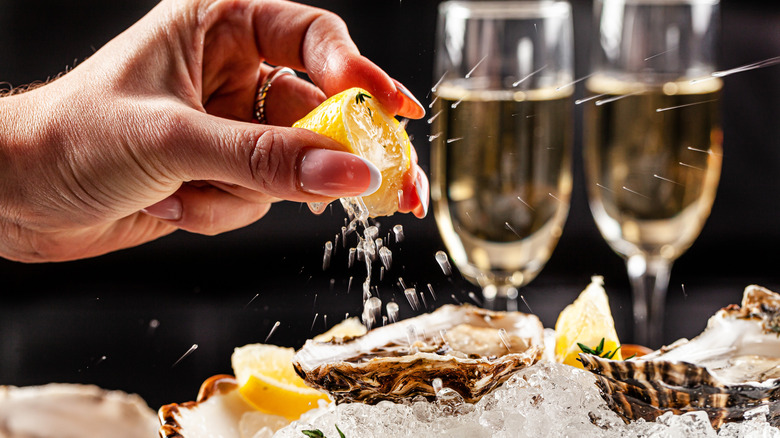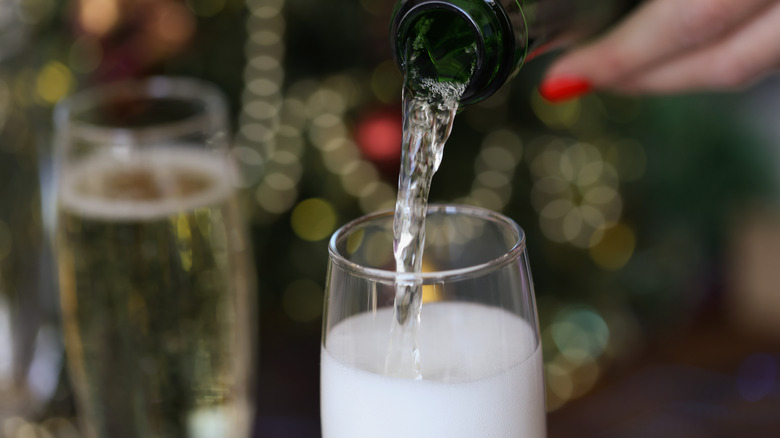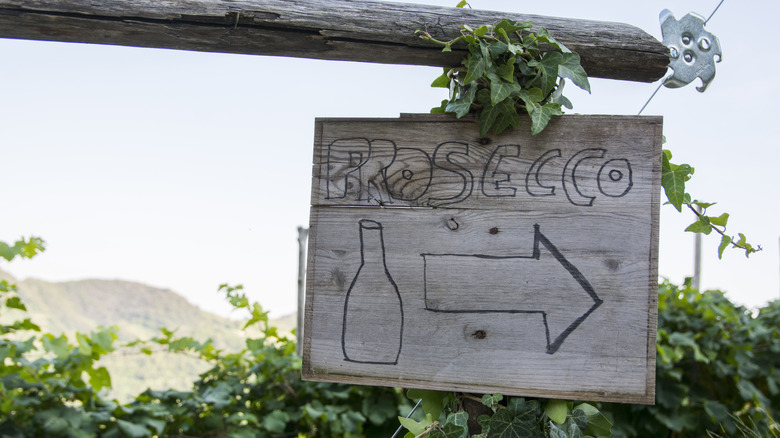Does Prosecco Really Cause The Worst Hangovers?
Who doesn't love a fragrant bubbly wine for lighthearted fun and unpretentious relaxation? Plenty of Prosecco lovers might feel exactly that way, albeit from a fun-yet-serious perspective. For Italian winemakers in the region of Conegliano Valdobbiadene, creating Prosecco sparkling white wine has been an acclaimed art form in northeast Italy for at least 300 years, explains London's Prosecco House bar, which serves 28 types of premium Prosecco from Italy. That's 28 possible ways to get a hangover.
Wait, what's all this talk about headaches and hangovers? Everyone knows that alcohol has the potential to make itself memorable in the morning-after light of day, so a sparkling wine like Prosecco is unlikely to be an exception. However, it actually contains a lower amount of alcohol than many other wines, with Real Simple placing it in a "very low" category of under 12.5%. That compares to other white wines such as certain chardonnay and pinot gris varieties containing up to 14.5% alcohol. If Prosecco truly belongs in the reported "worst hangover" category, then it's not because of a higher jolt of ABV (alcohol by volume.) But there is one little thing that gives credence to the hangover reputation – in fact, it's a whole lot of little things sparkling, dancing, and singing in your pretty chilled tulip glass.
It's all about the bubbles
The dreaded hangover following a perfectly lovely evening is the bane of a wine lover's existence. Double that for the fizzy favorites, which unfortunately include Prosecco. Many experts and scientists even state that Prosecco causes more hangover symptoms than other wines. Dietitian Lee Holmes explained to Daily Mail Australia that hangovers result from brain inflammation as well as the brain's reaction to alcohol's "depressant mechanism" – and the resulting symptoms are more prominent with Prosecco consumption because the human body absorbs it more quickly than it does other alcoholic drinks. The reason for that is really quite simple.
Carbon dioxide tucks itself within those perky little Prosecco bubbles, leading to accelerated absorption and a resulting higher alcohol level in your body. Club Vino founder and sommelier Marco Castelanelli told Delish, "Once in the bloodstream the Co2 competes with oxygen which is why you might feel a little woozy and rather drunk rather quickly, leading to an exaggerated hangover in the form of a pounding head."
To delve even deeper into the impact of Prosecco hangovers, Sell Wine describes the impact of biogenic amines, which occur naturally during winemaking but remain in the body longer and in higher amounts when consuming Prosecco or Champagne. Biogenic amines also live in some foods, including fish, red meat, various fruits, and even chocolate, so it's best to pair Prosecco with these foods.
Counteracting the infamous Prosecco hangover
Fortunately, you don't have to give up the festive bubbly fun of Prosecco evenings with your besties. It just takes a bit of forethought to reduce the severity of a likely hangover. In addition to avoiding the double whammy of biogenic amines from food and Prosecco combinations, Sell Wine recommends staying hydrated by sipping water before and during Prosecco time, which flushes out toxins and helps prevent the onset of severe headaches.
Some experts have suggested electrolyte-rich sports drinks as an alternative to plain water for rehydration after fluid loss, though there doesn't appear to be conclusive evidence that it helps significantly (via the New Haven Register). Sleeping it off, if possible, can help with the lethargy component of a hangover, aided by a long soak in magnesium mineral salts, such as the readily available Epsom salt, per The Sun U.S. Once sufficiently rehydrated, a run or other form of light exercise can release endorphins and lighten your mood. Healthline discusses wine hangovers in general, concurring with the need for rehydration and sleep as well as taking over-the-counter pain relievers and eating a bland breakfast such as toast and broth.
As for prevention, whether it's Prosecco Time or any other gathering involving alcohol, Healthline advises: Drink slower, drink less, drink water, and avoid drinking wine on an empty stomach.


